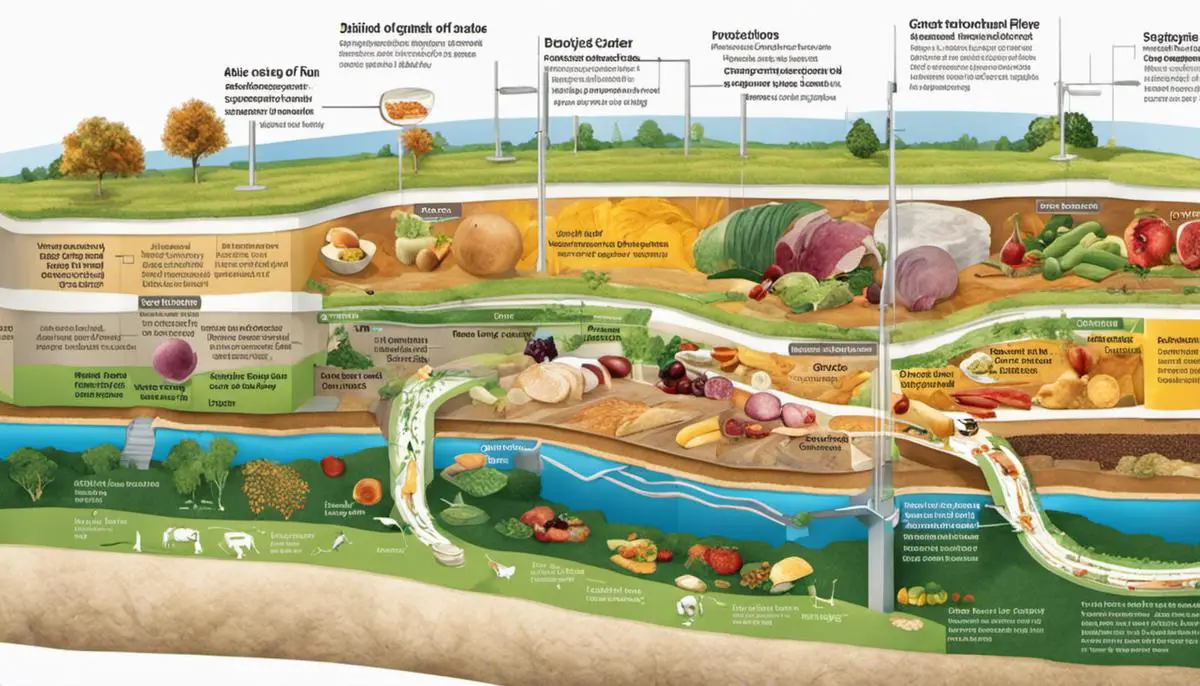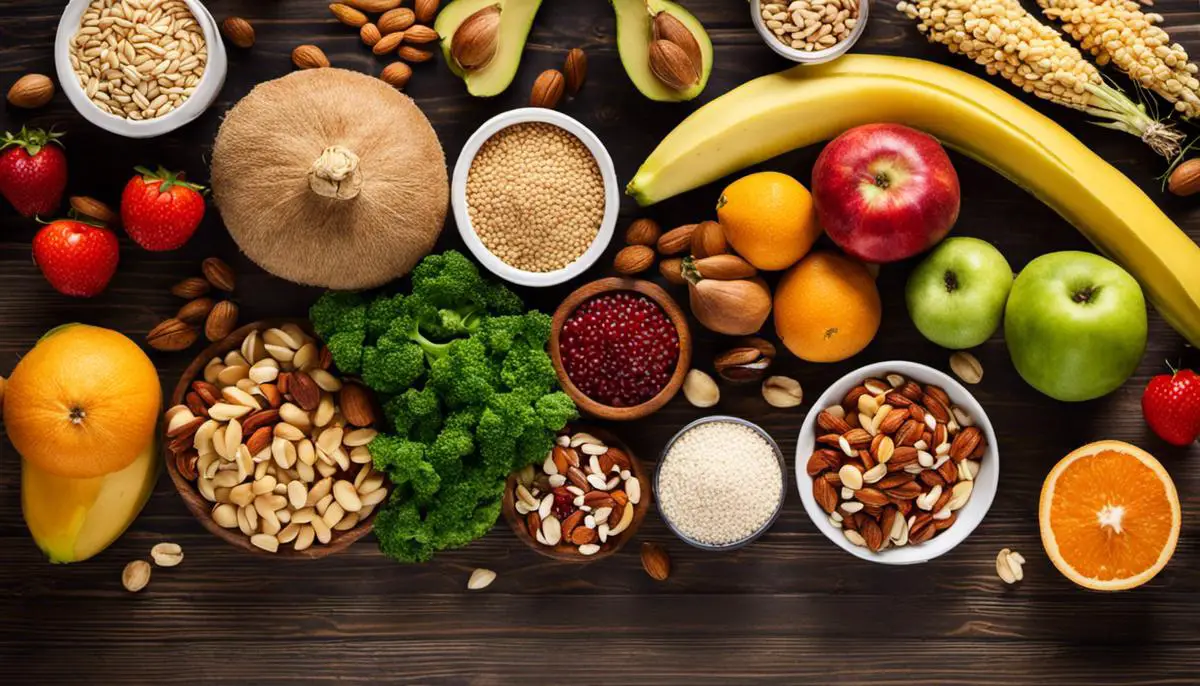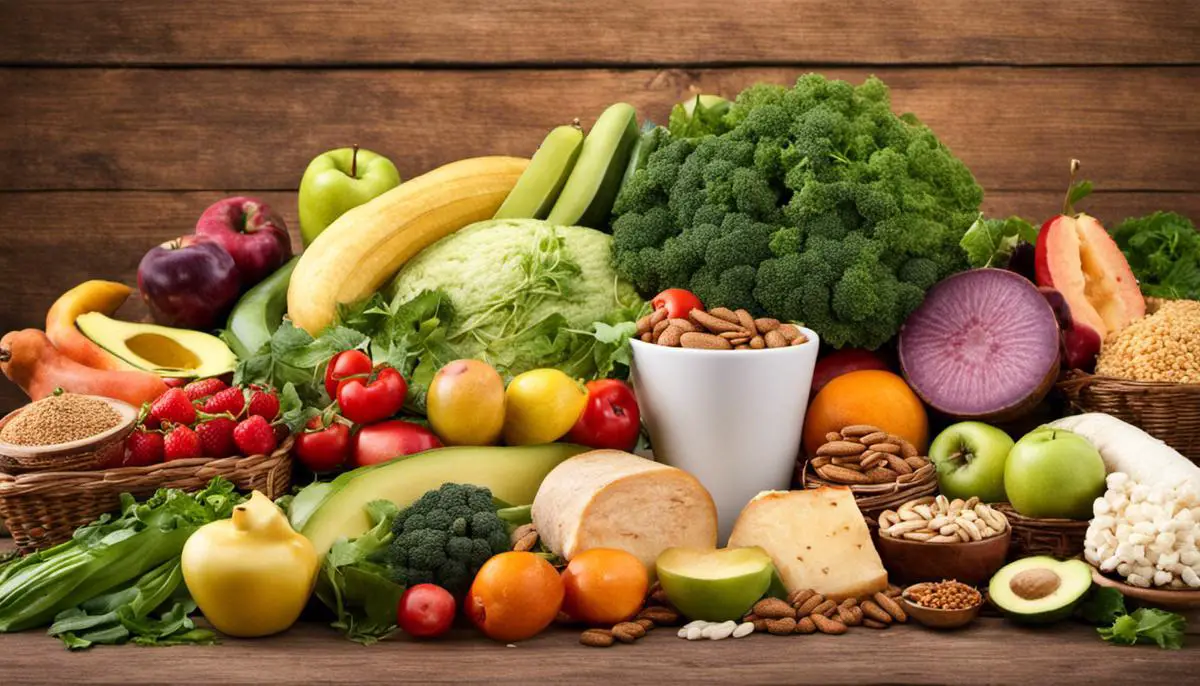Dietary fiber plays a pivotal role in maintaining a healthy digestive system, acting as a crucial component in the breakdown and transit of food. Understanding the distinction between soluble and insoluble fiber, where they are derived from, and how they influence digestion and bowel regularity is essential for those seeking to optimize their digestive health. This discourse further delves into the specifics of how fiber aids in maintaining bowel regularity. Through an exploration of the underlying scientific processes, this content aims to create a comprehensive understanding of the effect different types of fiber have on bowel movements as well as the symptoms of irregular bowel movement that can be significantly improved with an increased fiber intake.
Roles of Dietary Fiber in Digestion
The Essential Role of Dietary Fiber in Digestion
Dietary fiber is a vital nutrient that your digestive system needs to function properly. It is a type of carbohydrate that the body cannot digest, so instead, it passes through the gastrointestinal tract undigested, helping to promote the transit of other foods and waste products.
Understanding Soluble and Insoluble Fibers
Broadly, dietary fiber can be categorized into two types – soluble and insoluble fiber. Both kinds play a crucial role in digestion, but they work in different ways.
Soluble Fiber
Soluble fiber dissolves in water and transforms into a gel-like substance. It helps to slow down the digestive process by trapping carbohydrates and sugars, which helps regulate blood sugar levels. Soluble fiber can be found in oatmeal, lentils, apples, oranges, pears, nuts, flaxseeds, cucumbers, celery, and carrots.
Insoluble Fiber
On the other hand, insoluble fiber does not dissolve in water, remaining essentially intact as it moves through your digestive system. Its primary role is to add bulk to the stool, preventing constipation and promoting regular bowel movements. Insoluble fiber can be found in whole grains, wheat bran, corn bran, seeds, nuts, barley, couscous, brown rice, zucchini, celery, broccoli, and tomatoes.
Role of Dietary Fiber in Digestion and Promoting Bowel Regularity
Dietary fiber, with its significant impact on digestion, stands as a vital component in maintaining optimal bowel health. It enriches our diets by adding bulk to them, consequently preventing constipation and regularizing bowel movements. Moreover, fiber promotes a stable gut environment that fosters the proliferation of beneficial bacteria.
An important aspect of fiber is its ability to maintain an ideal pace for food to move through the digestive system. This prevents accumulation of toxins and waste while ensuring our body absorbs food nutrients more efficiently. The result? A satisfying feeling of satiety.
People dealing with irregular bowel movements or constipation can benefit enormously from increasing their dietary fiber intake. However, it’s essential to proceed with caution, gradually incorporating more fiber into your diet and hydrating sufficiently. A sudden surge in fiber intake may cause unwanted side effects like bloating, gas, or even aggravated constipation owing to dehydration.
One should not overlook the broader role of fiber in enhancing digestive health as it reaches beyond ensuring regular bowel movements. Some fiber types function as prebiotics that stimulate the growth and activity of gut-friendly bacteria, which in turn produce health-boosting short-chain fatty acids. These advantages accrue in the form of improved gut health and immune function.
It’s also important to keep in mind that while fiber can be obtained from supplements, most health experts prefer sourcing fiber from whole foods for the added nutritional benefits they offer.

Fiber and Bowel Regularity
Educating Yourself About Dietary Fiber and Its Contribution to Bowel Regularity
Commonly known as roughage, dietary fiber refers to the indigestible part of our food, primarily sourced from plants. It carries a significant role in inducing healthy bowel movements and ensuring regularity. The scientific world identifies two primary types of dietary fiber – soluble and insoluble fiber. Each plays their individual part in encouraging bowel regularity.
Soluble fiber transforms into a gel-like substance in the digestive tract after dissolving in water. It’s found in foods like oats, peas, beans, apples, citrus fruits, carrots, and barley. This kind of fiber slows down digestion by delaying stomach emptying, thereby helping you feel fuller for a longer period, which can be instrumental in managing weight. In addition, it aids in reducing levels of blood cholesterol and glucose.
Insoluble fiber, unlike soluble fiber, doesn’t dissolve in water. It enhances stool bulk and assists in the material’s movement through the digestive system. Consequently, it proves particularly beneficial for people grappling with constipation or irregular stools. You can find this type of fiber in wheat bran, whole wheat flour, nuts, beans, and certain vegetables such as cauliflower, green beans, and potatoes.
Fiber’s Impact on Bowel Movements
When food intake lacks enough fiber, the colon absorbs more water from fecal matter, leading to harder and less voluminous stools, which may cause constipation. Slow transit through the bowel may also increase the risk of developing gut problems, such as diverticular disease and colorectal cancer.
Fiber, particularly insoluble fiber, adds bulk to the stool, which helps keep it soft and speeds up its passage through the colon. This swift movement allows for a better stool consistency and a minimized straining during bowel movements. Soluble fiber, through its gel-forming properties, can also aid in softening stool and increasing its size.
Identifying and Alleviating Symptoms of Irregular Bowel Movements
Symptoms of irregular bowel movements can vary greatly from person to person and can include constipation, diarrhea, bloating, and abdominal pain. An increased intake of fiber, combined with adequate hydration, may help mitigate these symptoms. Consumption of high-fiber foods, fiber supplements or adding fibrous ingredients to meals can increase daily fiber intake.
For constipation, incorporating more insoluble fibers like wheat bran, vegetables, and whole grains in the diet can help promote regular bowel movements. Soluble fiber, on the other hand, can add bulk to stools and help with diarrhea. It’s essential always to increase fiber intake gradually to avoid bloating and gas, and to also increase fluid intake at the same time.
In wrapping up, it’s clear that dietary fiber has a vital role in maintaining regular bowel movements. The two kinds of fiber – soluble and insoluble – exert different effects in our bodies and can help alleviate diverse symptoms of inconsistent bowel movements. As such, a balanced consumption of both fiber types is routinely suggested by health experts to ensure optimal digestive health.

Fiber-Rich Foods and their Benefits
Foods Rich in Fiber for Ideal Digestive Health
Health professions strongly endorse a high-fiber diet as a way to encourage regular bowel movements. Dietary fiber, a nutrient derived from plants, navigates through our digestive system with little to no alteration. Whole grains, legumes, fruits, vegetables, nuts, and seeds are among the food items that are rich in fiber.
For instance, a cooked cup of split peas gives you around 16.3 grams of fiber while lentils and black beans come close, delivering approximately 15.6 and 15 grams respectively. It is also noteworthy that artichokes and avocados have a high fiber content, with about 10.3 and 10.5 grams per portion.
Whole grains including oats and brown rice are exceptional sources of dietary fiber. In addition to fiber, they also offer an array of essential nutrients such as B vitamins, iron, and magnesium. Fruits like raspberries, apples, and bananas are not only rich in fiber, but they also provide important vitamins like vitamin C and potassium.
The Role of Dietary Fiber in Bowel Regularity
Dietary fiber plays a pivotal role in maintaining bowel regularity by adding bulk and softness to stools, which aids in their passage. This can prevent constipation and aid in digestion. Consuming adequate fiber daily may also help prevent hemorrhoids and small pouches in your colon, known as diverticular disease.
Indeed, consuming a high-fiber diet promotes the formation of soft, bulky stools, making them easier to pass and reducing the risk of straining during bowel movements. This can ultimately lead to a decrease in digestive discomfort and the potential for long-term bowel problems.
Strategies for Increased Fiber Intake
While incorporating fiber-rich foods into your diet may seem challenging, there are numerous strategies to make the process easier. One approach is to start your day with a high-fiber breakfast, such as oatmeal or whole-grain toast. Snacking on fruits, nuts or seeds instead of highly processed junk food can also boost your fiber intake.
Consider swapping refined grains like white rice or pasta for their whole grain counterparts. When available, opt for fruits and vegetables with their skin on, as the skin is often rich in dietary fiber. For instance, a medium-sized apple with skin includes 4.4 grams of fiber, while a peeled one only provides about 2.1 grams.
Additionally, introducing legumes into your diet is a great way to increase fiber. Lentils, chickpeas, and black beans can be incorporated into salads, stews, and soups. Lastly, remember to increase your fiber intake gradually to avoid unpleasant side effects such as bloating and gas, and drink plenty of water to aid in the digestion process.
Additional Nutritional Benefits of High-Fiber Foods
Beyond aiding digestion, fiber-rich foods have several other health benefits. For instance, they can help to maintain a healthy weight, as they are generally more filling, leading to decreased calorie intake. Some types of dietary fiber also serve as prebiotics, providing nourishment for the beneficial bacteria in your gut, which boosts overall gut health.
Moreover, consuming sufficient dietary fiber can reduce the risk of developing chronic diseases such as heart disease, stroke, and certain types of cancer. It also aids in controlling blood sugar levels by slowing the absorption of sugar into the bloodstream, which can be especially beneficial for people with diabetes.
In conclusion, a diet rich in fiber is essential for maintaining not just healthy bowel regularity but overall health and well-being. Therefore, it is crucial to consciously incorporate fiber-rich foods into daily meals and snacks.

Maintaining a rich fiber intake through a diverse and balanced diet offers remarkable benefits not only for the digestive system but overall health as well. A list of fiber-rich foods and their advantages have been shared, along with various strategies and meal ideas for integrating more fiber into everyday meals. Beyond just improving digestion and bowel regularity, fiber-rich foods also have additional nutritional values that significantly contribute to enhanced health and well-being. The power that an individual holds in influencing their health through dietary choices is indeed profound.
